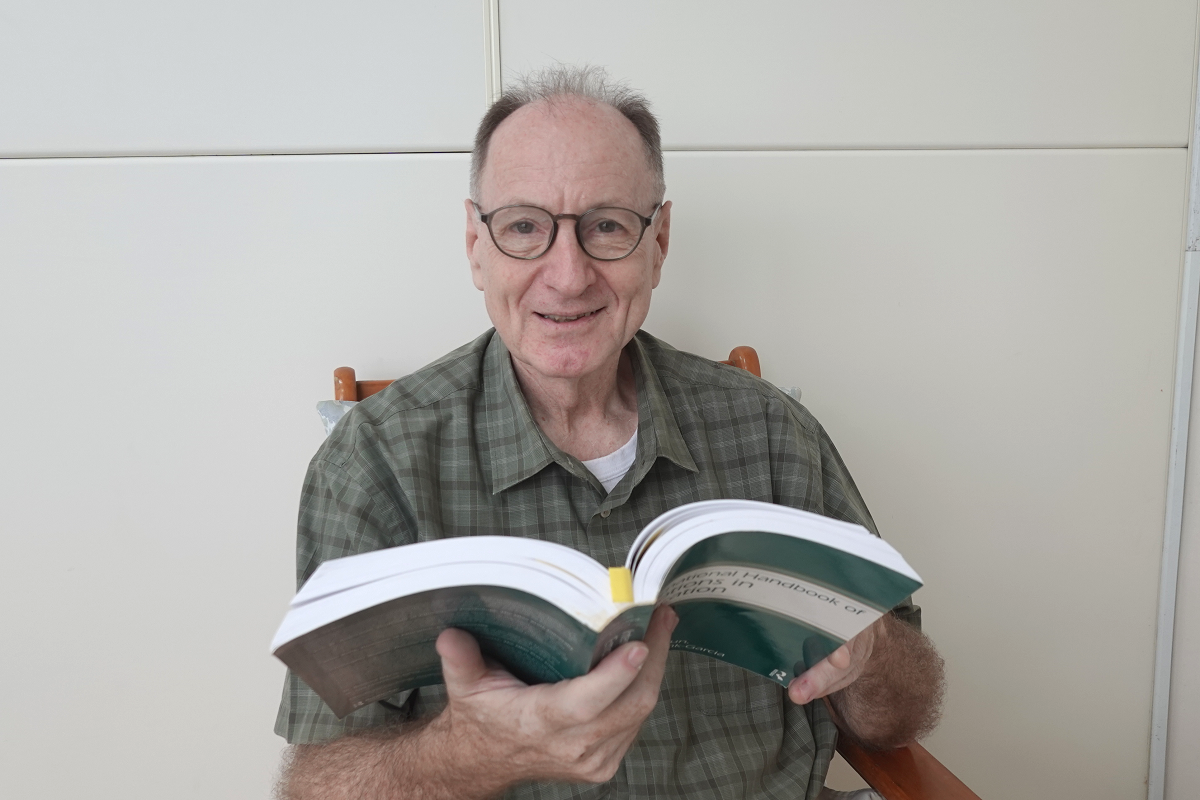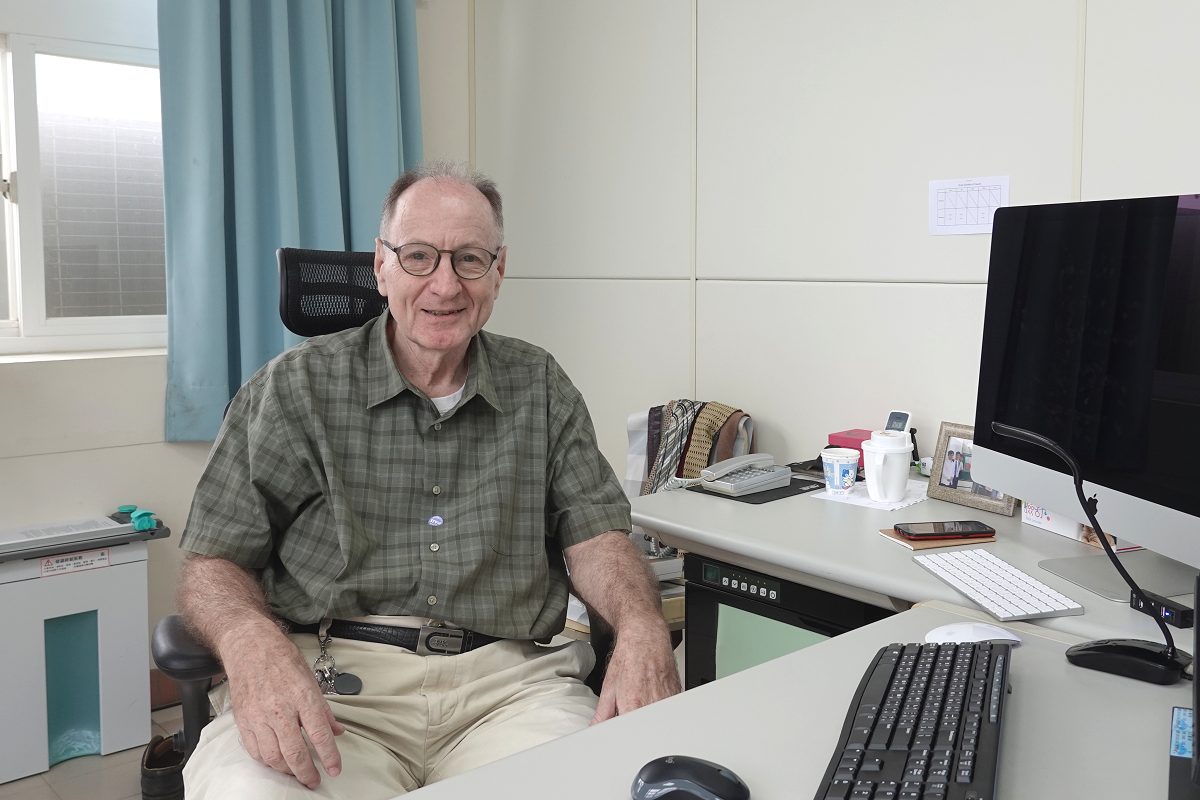Genuine interest in learning is the key element in growing successful future citizens, says Assistant Professor Brady M. Jack


2021-11-03
Assistant Professor Brady Michael Jack of Si Wan College strongly supports the position that the key to students’ success as well-rounded future citizens is the cultivation of genuine interest in lifelong learning. He has dedicated his academic career to researching the nature of genuine interest in learning and to understanding how students can be brought into more active engagement within the context of the classroom setting. “I believe all of us want to be involved in something meaningful. Find out what you have a natural inclination towards, test it and ask yourself whether you find personal meaning in that,” he says.
Dr. Jack has followed his own varied study interests across different fields of academic focus. Thirty-one years ago, having earned a Bachelor’s degree in Theology in the US, he came to Taiwan to study Mandarin and began pursuing his mission as a teacher: not only teaching English reading and writing, but later also earning a Master’s degree in Information and Computer Education and a Ph.D. in Science Education from the National Kaohsiung Normal University. Dr. Jack became a postdoctoral researcher under Chair Professor Huann-Shyang Lin at NSYSU, thanks to whom he developed his enthusiasm for exploring the concept of genuine interest in the context of learning and teaching. Most recently, Dr. Jack along with Dr. Chen-Chi Chen, a statistic specialist at the College Entrance Examination Center, and Dr. Thomas J. Smith, a visiting professor from the Department of Educational Technology, Research and Assessment at Northern Illinois University, became the first to establish empirical evidence statistically validating and demonstrating the latent variables of learning interest and learning enjoyment which underlie the theoretical construct of genuine interest.
The concept of genuine interest has been in educational psychology from the mid-19th century; John Dewey, a philosopher of education defined it as “the accompaniment of the identification, through action, of the self with some object or idea, because of the necessity of that object or idea for the maintenance of self-expression.” Dr. Jack has been operationalizing the theory to capture students’ interest in the process of learning, seeking to promote within them enjoyment in the process of their own personal self-discovery. “As educators, for students to develop a long-term interest in our subject and increase their knowledge and skills, we need to provide learning opportunities in which they develop delight and fascination in the process itself and make possible personal discovery. If we can mentor such interest in students, we can teach them crucial skills indispensable for responsible future citizens, willing to be part of the solution to such issues as epidemics, PM 2.5, or greenhouse gasses,” says Dr. Jack. One such skill at the center of Dr. Jack’s instruction in his courses at NSYSU is critical thinking.
Critical thinking is particularly important for us who live in what has been described as the post-truth era, where objective facts have less influence in determining what is true than does emotion and personal bias, and the personal sense of what is truth is constricted by social media information bubbles headlining outrageous statements styled to drive the clickability of questionable information sources, says Dr. Jack. For determining what is true from what is not, he asks students enrolled in his course “Thinking Critically in a Post-truth Era” to carefully consider what is being said, the credibility of the source, and whether or not the information is up-to-date. Also important is understanding the value of the information within the broader context of all supporting evidence, references to additional credible sources and experts’ opinions, and checking for personal biases that may hinder interpreting the validity and credibility of the information. “Being friends with people who don’t agree with you will keep us from falling into the trap of post-truth,” says Assistant Professor Jack. “The way to maintain strength and resist this trap of post-truth thought is by developing a careful and critical mind which seeks to find and follow truth. And I want my students to develop into being such a person.”
Note:
Papers of interest
Jack, B. M., Chen, C.-C., & Smith, T. J. (2020). Validating Dewey’s notion of genuine interest. Journal of Psychoeducational Assessment, 39(3), 301-314. doi:10.1177/0734282920967133
Jack, B. M., & Lin, H.-s. (2014). Igniting and sustaining interest among students who have grown cold toward science. Science Education, 98(5), 792-814. doi:https://doi.org/10.1002/sce.21119
Jack, B. M., & Lin, H.-s. (2017). Making learning interesting and its application to the science classroom. Studies in Science Education, 53(2), 137-164. doi:10.1080/03057267.2017.1305543
Jack, B. M., & Lin, H.-s. (2018). Warning! Increases in interest without enjoyment may not be trend predictive of genuine interest in learning science. International Journal of Educational Development, 62, 136-147. doi:10.1016/j.ijedudev.2018.03.005
Assistant Professor Brady Michael Jack of Si Wan College strongly supports the position that the key to students’ success as well-rounded future citizens is the cultivation of genuine interest in lifelong learning. He has dedicated his academic career to researching the nature of genuine interest in learning and to understanding how students can be brought into more active engagement within the context of the classroom setting. “I believe all of us want to be involved in something meaningful. Find out what you have a natural inclination towards, test it and ask yourself whether you find personal meaning in that,” he says.
Dr. Jack has followed his own varied study interests across different fields of academic focus. Thirty-one years ago, having earned a Bachelor’s degree in Theology in the US, he came to Taiwan to study Mandarin and began pursuing his mission as a teacher: not only teaching English reading and writing, but later also earning a Master’s degree in Information and Computer Education and a Ph.D. in Science Education from the National Kaohsiung Normal University. Dr. Jack became a postdoctoral researcher under Chair Professor Huann-Shyang Lin at NSYSU, thanks to whom he developed his enthusiasm for exploring the concept of genuine interest in the context of learning and teaching. Most recently, Dr. Jack along with Dr. Chen-Chi Chen, a statistic specialist at the College Entrance Examination Center, and Dr. Thomas J. Smith, a visiting professor from the Department of Educational Technology, Research and Assessment at Northern Illinois University, became the first to establish empirical evidence statistically validating and demonstrating the latent variables of learning interest and learning enjoyment which underlie the theoretical construct of genuine interest.
The concept of genuine interest has been in educational psychology from the mid-19th century; John Dewey, a philosopher of education defined it as “the accompaniment of the identification, through action, of the self with some object or idea, because of the necessity of that object or idea for the maintenance of self-expression.” Dr. Jack has been operationalizing the theory to capture students’ interest in the process of learning, seeking to promote within them enjoyment in the process of their own personal self-discovery. “As educators, for students to develop a long-term interest in our subject and increase their knowledge and skills, we need to provide learning opportunities in which they develop delight and fascination in the process itself and make possible personal discovery. If we can mentor such interest in students, we can teach them crucial skills indispensable for responsible future citizens, willing to be part of the solution to such issues as epidemics, PM 2.5, or greenhouse gasses,” says Dr. Jack. One such skill at the center of Dr. Jack’s instruction in his courses at NSYSU is critical thinking.
Critical thinking is particularly important for us who live in what has been described as the post-truth era, where objective facts have less influence in determining what is true than does emotion and personal bias, and the personal sense of what is truth is constricted by social media information bubbles headlining outrageous statements styled to drive the clickability of questionable information sources, says Dr. Jack. For determining what is true from what is not, he asks students enrolled in his course “Thinking Critically in a Post-truth Era” to carefully consider what is being said, the credibility of the source, and whether or not the information is up-to-date. Also important is understanding the value of the information within the broader context of all supporting evidence, references to additional credible sources and experts’ opinions, and checking for personal biases that may hinder interpreting the validity and credibility of the information. “Being friends with people who don’t agree with you will keep us from falling into the trap of post-truth,” says Assistant Professor Jack. “The way to maintain strength and resist this trap of post-truth thought is by developing a careful and critical mind which seeks to find and follow truth. And I want my students to develop into being such a person.”
Note:
Papers of interest
Jack, B. M., Chen, C.-C., & Smith, T. J. (2020). Validating Dewey’s notion of genuine interest. Journal of Psychoeducational Assessment, 39(3), 301-314. doi:10.1177/0734282920967133
Jack, B. M., & Lin, H.-s. (2014). Igniting and sustaining interest among students who have grown cold toward science. Science Education, 98(5), 792-814. doi:https://doi.org/10.1002/sce.21119
Jack, B. M., & Lin, H.-s. (2017). Making learning interesting and its application to the science classroom. Studies in Science Education, 53(2), 137-164. doi:10.1080/03057267.2017.1305543
Jack, B. M., & Lin, H.-s. (2018). Warning! Increases in interest without enjoyment may not be trend predictive of genuine interest in learning science. International Journal of Educational Development, 62, 136-147. doi:10.1016/j.ijedudev.2018.03.005
Click Num:
Share
